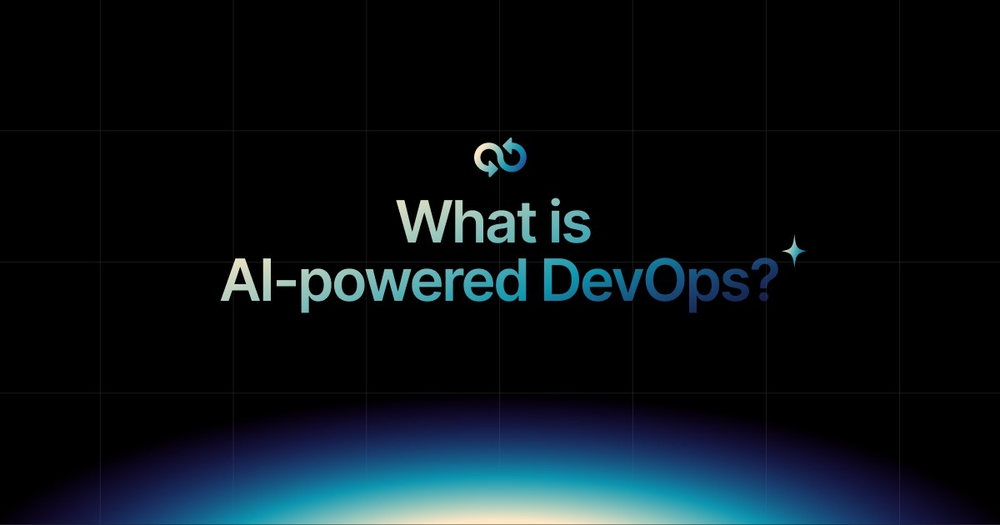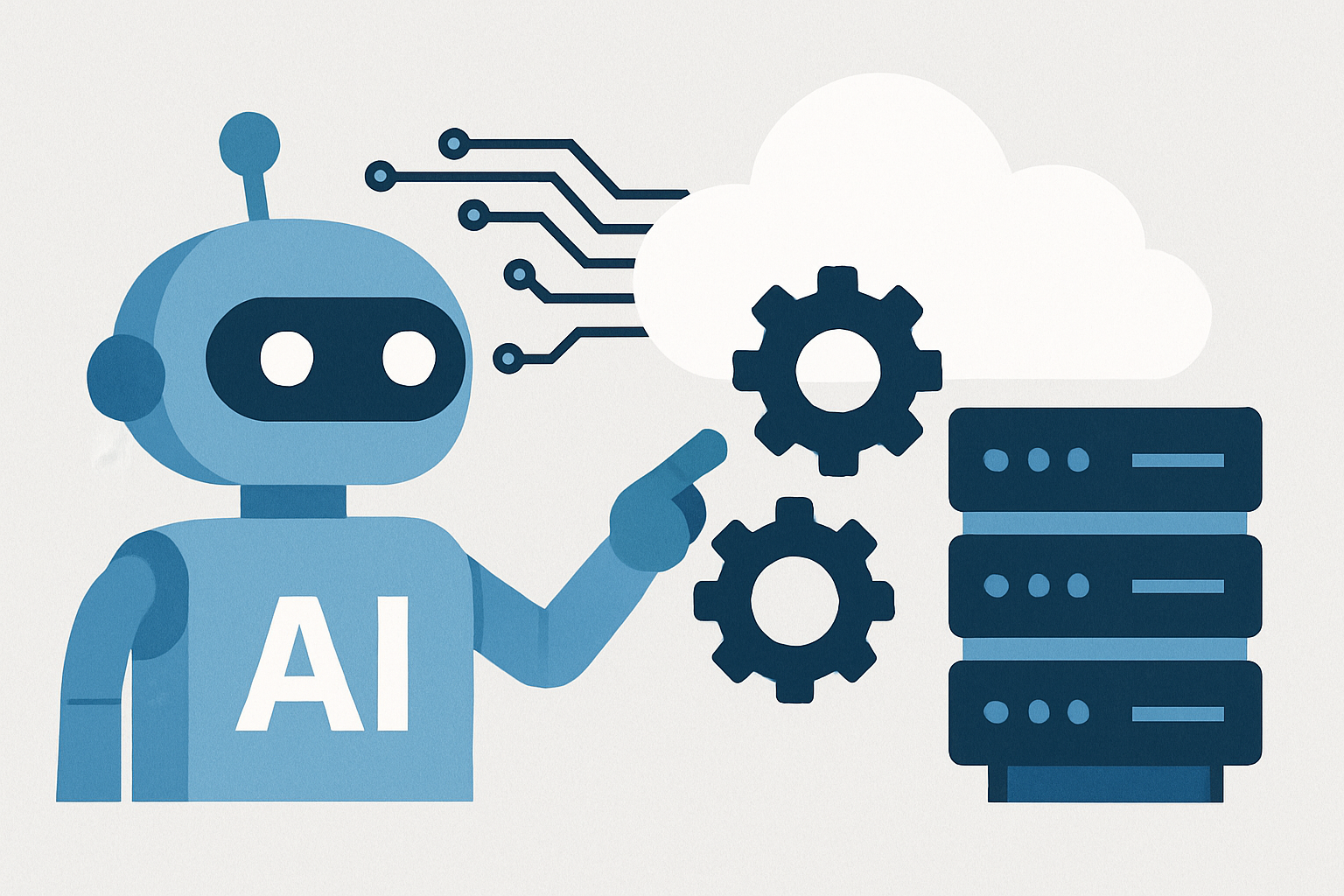Published
- 7 min read
What is AI-powered DevOps?

AI-powered DevOps is the integration of artificial intelligence into the software development lifecycle to automate, optimize, and enhance traditional DevOps workflows.
From smarter CI/CD pipelines, predictive monitoring, and automated deployment, to self-healing systems, AI is now playing a major role in how applications are built, tested, and deployed at scale. As cloud infrastructures grow more complex, AI-powered DevOps offers a scalable, efficient, and resilient solution.
 In the software development world today, teams are expected to release code faster, more reliably, and with fewer bugs. But as deployment frequency increases, so does the complexity of infrastructure, testing, monitoring, and automation.
In the software development world today, teams are expected to release code faster, more reliably, and with fewer bugs. But as deployment frequency increases, so does the complexity of infrastructure, testing, monitoring, and automation.
This is where AI-powered DevOps enters the picture, bringing machine learning, intelligent automation, and predictive analytics into the traditional DevOps workflow.
But what exactly is AI-powered DevOps, and how is it transforming the way developers and operations teams work together?
Let’s break it down in detail.
The evolution of DevOps
DevOps, short for Development and Operations, is a set of practices aimed at bridging the gap between software development and IT operations. It promotes faster code delivery, continuous integration, automated testing, and consistent deployment. The primary goals are speed, reliability, and scalability.
Traditionally, DevOps relies on scripting, configuration files, CI/CD pipelines, and manual oversight to keep things running smoothly. While this works, it often becomes burdensome as apps grow and infrastructures become more complex.
Here’s where AI steps in to take DevOps to the next level.
What Is AI-Powered DevOps?
 AI-powered DevOps refers to the integration of artificial intelligence and machine learning technologies into the DevOps process. Instead of relying solely on human intervention or scripted logic, AI enhances DevOps workflows by identifying patterns, predicting issues, automating tasks, and optimising performance.
AI-powered DevOps refers to the integration of artificial intelligence and machine learning technologies into the DevOps process. Instead of relying solely on human intervention or scripted logic, AI enhances DevOps workflows by identifying patterns, predicting issues, automating tasks, and optimising performance.
It’s not about replacing DevOps engineers, it’s about empowering them.
With AI, DevOps can:
- Predict deployment failures before they happen
- Auto-tune CI/CD pipelines
- Spot performance bottlenecks in real time
- Detect anomalies across logs, metrics, and traces
- Automate routine incident response tasks
The result? More resilient systems, reduced downtime, and faster recovery.
Why DevOps need AI today?
Software teams are under pressure to deliver faster, iterate frequently, and maintain uptime 24/7.
This leads to increasing stress on DevOps workflows, including:
- Too much data to monitor: Logs, metrics, events, network traces, modern apps generate huge volumes of observability data.
- Too many manual configurations: Each pipeline or deployment requires custom YAML files, scripts, and integrations.
- Unpredictable failure patterns: Infrastructure issues often surface in unique, unexpected ways.
AI-powered DevOps provides a smarter way to deal with this complexity. It introduces intelligent observability, predictive alerting, and auto-healing capabilities to systems that traditionally needed hands-on maintenance.
It’s like giving your infrastructure a brain that learns and adapts over time.
Key use cases of AI in DevOps
Let’s take a closer look at where AI-powered DevOps is making a real impact:
Intelligent monitoring & alerting
Traditional monitoring tools send alerts based on thresholds. But thresholds don’t account for context. AI can analyse historical performance data, understand behaviour patterns, and send alerts only when something truly abnormal happens.
For example, if your app’s memory usage always spikes at 2 PM, a human-set threshold might flag it every day, but an AI-based system learns that it’s normal and doesn’t cry wolf.
Predictive incident management
Machine learning models can analyse past incident data to predict where failures are likely to occur next. Instead of reacting to outages, teams can proactively prevent them.
AI can even suggest fixes, link similar incidents, and offer automated remediation based on past outcomes.
Automated root cause analysis
Finding the root cause of a failure across distributed systems is time-consuming. AI can sift through logs, metrics, traces, and events to identify anomalies, map dependencies, and pinpoint the source of failure.
This reduces MTTR (Mean Time to Recovery) significantly, which directly affects user experience.
Smarter CI/CD pipelines
AI can optimise pipelines by automatically detecting slow builds, flaky tests, or unnecessary steps. It can recommend faster paths, reorder jobs, or suggest caching strategies that improve performance.
In some cases, AI can even pause or halt deployments that are likely to fail based on past indicators.
Intelligent resource management
Cloud resources cost money. AI helps optimise usage by analysing patterns of traffic, compute, and storage. It can scale resources up and down based on predictive demand, reducing waste and improving performance.
This is especially useful for companies trying to optimise their cloud spend without sacrificing reliability.
Benefits of AI-Powered DevOps
The biggest advantage of AI in DevOps is its ability to learn from data. Over time, systems powered by AI get better at:
- Reducing alert fatigue
- Identifying root causes faster
- Preventing repeat incidents
- Accelerating release velocity
- Reducing downtime
- Cutting infrastructure costs
Teams become more agile, less reactive, and more confident in their releases. Developers can focus on innovation, while the AI handles routine ops and monitoring.
It’s not just about automation, it’s about intelligent automation.
Challenges with AI-Powered DevOps
Like any innovation, AI in DevOps comes with its own challenges:
- Data quality: AI relies on accurate, comprehensive data to make smart decisions. Poor logs or missing metrics can affect performance.
- Model training: Some platforms require time to learn from your infrastructure before they become effective.
- Team adoption: Not all engineers are ready to trust AI suggestions, especially when the model acts as a black box.
However, these challenges are being solved quickly with better tooling, more transparent models, and platforms that make AI feel like an assistant, not a replacement.
The Future of DevOps is AI-First
In the next few years, AI will become a core part of how teams build, ship, and scale software. DevOps roles will evolve to focus more on strategy, tooling, and orchestration while AI handles the repetition, alerts, and predictive analytics.
Think of AI-powered DevOps as your second brain — constantly watching over your system, learning how it behaves, and stepping in when something’s off.
We’re moving from manual pipelines and reactive alerting to smart systems that understand, predict, and optimise.
How Kuberns makes AI-powered DevOps effortless?
If you’re ready to adopt AI-powered DevOps without all the setup, Kuberns makes it incredibly easy.

Kuberns is an AI-powered cloud deployment platform that automates everything from build to production in just one click. You connect your GitHub repo, and Kuberns does the rest:
- Auto-detects your framework (Node.js, Python, Django, etc.)
- Builds, tests, and deploys your app using best practices
- Monitors performance, alerts on anomalies, and enables 1-click rollbacks
- Manages infrastructure automatically, no need to write YAML, manage secrets, or provision cloud resources
Behind the scenes, Kuberns uses AI to:
- Predict and prevent failed builds
- Optimise deployment pipelines
- Auto-scale based on traffic patterns
- Detect issues before they hit users
Whether you’re building an MVP, managing microservices, or running large-scale APIs, Kuberns gives you AI-powered DevOps without the complexity.
You code. Kuberns deploys. AI manages everything else.
Conclusion
AI-powered DevOps isn’t a buzzword; it’s a better way to build and deploy software. By combining the speed of DevOps with the intelligence of AI, teams can ship more confidently, scale with ease, and recover from failures faster.
If you’re still managing your own CI/CD scripts, debugging YAML, or stressing over cloud infra, it’s time to upgrade.
Start with smarter DevOps. Start with Kuberns.
FAQs on AI-Powered DevOps
1. Is AI going to replace DevOps engineers?
No. AI is here to assist, not replace. It automates repetitive tasks and provides insights, freeing engineers to focus on strategy and innovation.
2. What types of teams benefit most from AI in DevOps?
Startups, scale-ups, and enterprise teams with complex infrastructure or fast-paced deployments benefit the most from AI-powered DevOps.
3. Do I need to know machine learning to use AI in DevOps?
Not at all. Platforms like Kuberns abstract the complexity, so you get AI benefits without writing ML models.
4. How does Kuberns use AI differently from other platforms?
Kuberns integrates AI into the deployment process itself, not just monitoring. It helps you avoid failed builds, optimise performance, and recover faster.
5. How can I get started with Kuberns?
Just visit kuberns.com, connect your GitHub repo, and let Kuberns handle the rest. You’ll be live in minutes with AI watching your back.